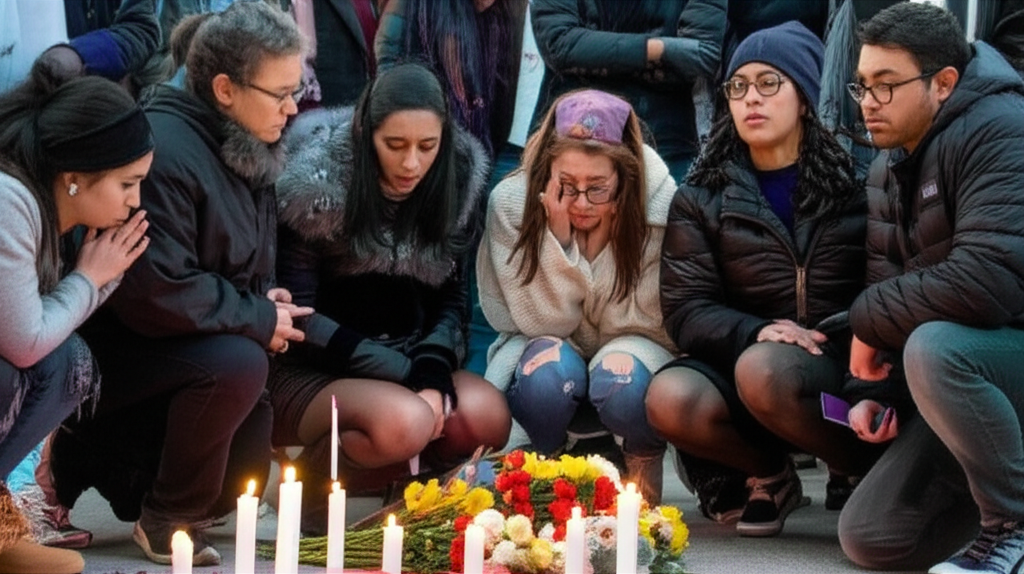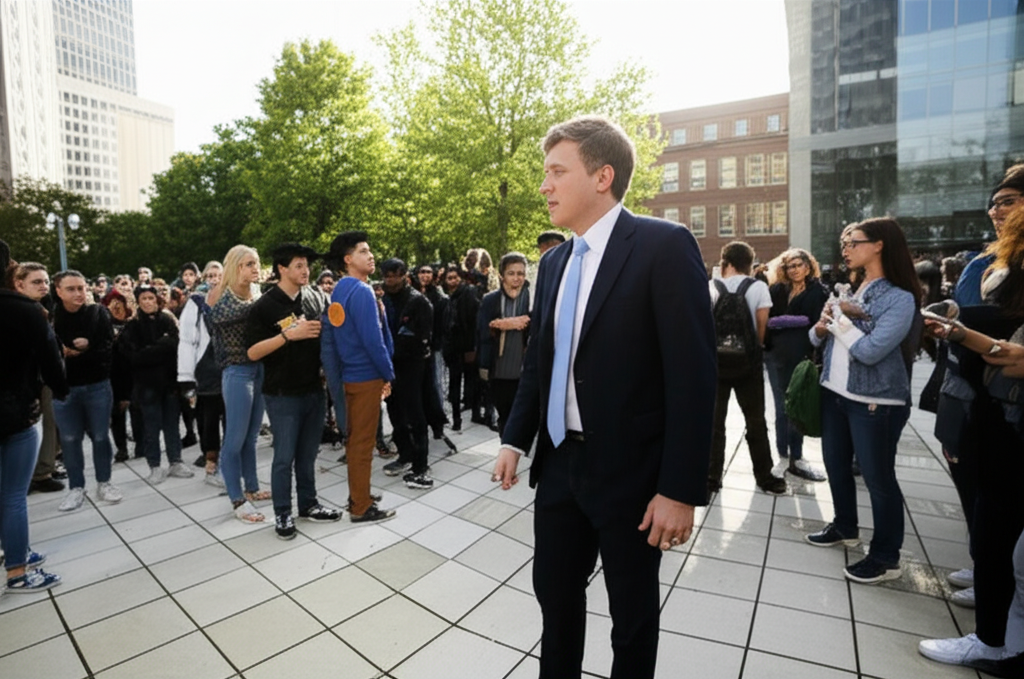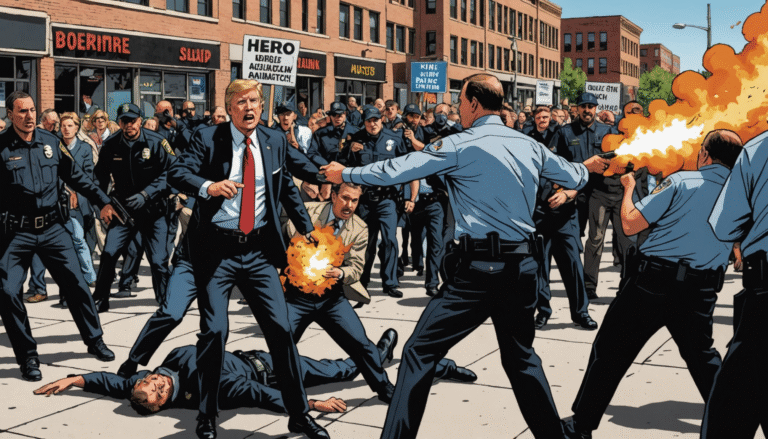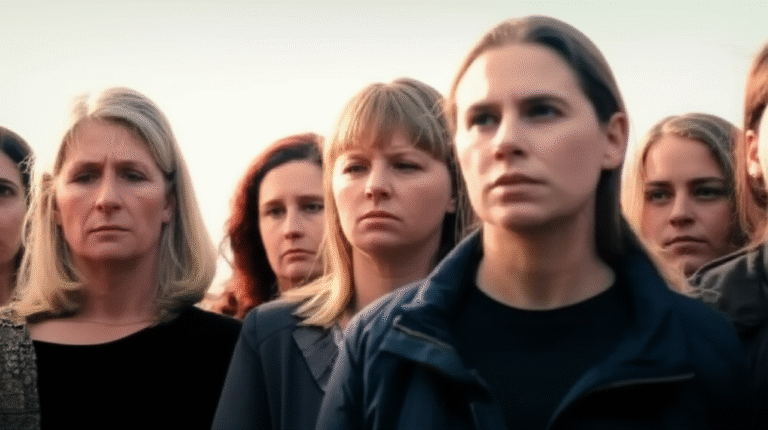
The tragic news of Charlie Kirk’s death sent ripples across the nation, profoundly impacting young Americans and initiating critical conversations about political discourse and civility. Graphic videos depicting the shooting of the conservative activist swept across social media platforms, making the event an indelible moment for many, particularly Generation Z. This public killing of a prominent political leader, who at 31 was not much older than many young voters, compelled a generation accustomed to consuming news through digital channels to confront a stark reality.

The Death of Charlie Kirk and Its Immediate Aftermath
Charlie Kirk, a co-founder of the conservative political advocacy group, Turning Point USA, and a staunch ally of President Donald Trump, was shot at long range during a campus event in Orem, Utah. This incident immediately resonated within conservative youth circles, where he was mourned as one of their own. His influence had been significant, with President Trump himself crediting Kirk with mobilizing younger voters and voters of color in support of his winning 2024 election campaign. Kirk’s extensive digital presence, including over five million followers on X and millions more on TikTok, along with a popular podcast and radio program, “The Charlie Kirk Show,” ensured that the news of his death reached a vast and diverse audience rapidly.
The grief following Kirk’s death, however, was not universally shared across Gen Z or other demographic groups. Some liberal individuals online expressed a lack of sympathy, citing Kirk’s historical support for gun rights and past statements concerning women and transgender people, which they found inflammatory. This polarized reaction underscored the deep divisions within the contemporary political landscape, even in the face of such a significant loss.
“Regardless of who he is and what his beliefs are, nobody should die like that and be assassinated. He does have First Amendment rights to free speech.” – Ama Baffour, a 20-year-old student at Howard University
Kirk’s Influence on Young Americans
Kirk had cultivated a unique connection with young audiences, largely through his distinctive approach to online content. He captured widespread attention by posting short, unpolished videos of his debates and interactions with college students. This style, according to Tim Weninger, a University of Notre Dame professor who studies social media algorithms, made him appear “very real” to his followers, fostering a sense of authenticity and direct engagement that resonated with digital natives. The accessibility of his content across various platforms allowed him to build a substantial following among those who prefer podcasts and livestreamed video over traditional television news.
The way young Americans consume news was a critical factor in how word of Kirk’s passing disseminated. A Pew Research Center survey from the previous year indicated that approximately 39 percent of adults under 30 regularly obtain their news from video platforms such as TikTok. This reliance on visual, short-form content meant that graphic videos of the shooting rapidly circulated, reaching millions in a highly impactful format.
- Charlie Kirk, 31, was a co-founder of Turning Point USA and a prominent conservative ally.
- He maintained a large online presence, including over five million followers on X and millions on TikTok.
- His unpolished debate videos with college students contributed to his “very real” image.
- Approximately 39% of adults under 30 regularly get news from video platforms like TikTok.
- News of his shooting spread faster due to multi-angle videos posted on social media.
Dissemination of News in the Digital Age
The speed at which awareness of Kirk’s shooting spread was notably faster than many past news events, a phenomenon attributed to the prevalent use of video-based platforms. Josephine Lukito, a University of Texas at Austin professor specializing in political communication and social media, noted that observers filmed the event from multiple angles and promptly posted these videos online. This immediate, multi-perspective coverage ensured that the incident was not only witnessed by many but also experienced through the raw, unfiltered lens of citizen journalism.
Evander Thomas, a 21-year-old student at Howard University, recounted how he learned of Kirk’s death. Though he often watched Kirk on his TikTok feed despite disagreeing with his political views, the news came to him when a friend shared a video in a group chat. This firsthand account highlights the peer-to-peer, informal nature of news dissemination within Gen Z’s social networks. Thomas reflected on the broader implications of the event, stating, “No matter what your political views are, nobody should ever have to die for it.”

Bipartisan Reactions and Calls for Civility
The incident spurred a notable call for civility and cross-party understanding, particularly among young political leaders. Manu Anpalagan, president of the Yale College Republicans, expressed admiration for Kirk’s commitment to open debate with his political opposites, even while acknowledging he did not condone all of Kirk’s views. In a significant display of unity, Anpalagan co-wrote an op-ed in the Yale Daily News alongside his Democratic counterpart, unequivocally denouncing the shooting. His call for mutual respect resonated broadly: “I think both sides each really need to work on being more respectful, being more civil in their conversations and in their debates.”
Further evidence of this bipartisan sentiment emerged within hours of Kirk’s death, when the Connecticut Young Republicans and Young Democrats of Connecticut issued a joint statement. This rare collaborative effort condemned the shooting as “unacceptable,” signaling a shared concern for the state of political discourse. Alan Cunningham, the 25-year-old president of the Young Democrats, perceived Kirk’s killing as a “volatile moment” for the country and promptly reached out to his Republican counterpart. This immediate willingness to speak in one voice underscored the gravity of the situation and the desire for a unified response to political violence.
Background
Charlie Kirk, born in 1993, had quickly risen to prominence within conservative circles. As a co-founder of Turning Point USA, established when he was just 18, he became a key figure in mobilizing youth for conservative causes. His organization focused on identifying, educating, training, and organizing students to promote the principles of freedom, free markets, and limited government. His steadfast support for President Donald Trump further cemented his position as an influential voice, particularly among young conservatives, whom he inspired to become politically involved. Patrick Burland, president of the Young Republicans, noted that Kirk served as a catalyst for many within the Gen Z generation to develop an interest in politics. “There are so many people I know that only became involved because they saw his conversations either online or on their campus,” Burland explained, highlighting Kirk’s direct impact through his accessible online debates and campus appearances. The rapid spread of news regarding his death through digital channels also reflects a broader shift in how young adults, in their 20s, predominantly receive news, favoring podcasts and livestreamed content over traditional media, as observed by Professor Tim Weninger.
The context of this incident is also framed by public sentiment regarding political violence. An October 2024 Reuters/Ipsos poll surveyed respondents aged 18-29 on the acceptability of political violence. The poll revealed a strong aversion to such actions, with the vast majority disagreeing with the statement “it is acceptable for someone in my political party to commit violence to achieve a political goal.” Only six percent of respondents endorsed this statement, indicating a widespread rejection of political violence among young adults, irrespective of their political leanings. This poll provides a crucial backdrop against which the reactions to Charlie Kirk’s death should be understood.
What’s Next

The immediate aftermath of Charlie Kirk’s death showed some promising signs of bringing young partisans together, as evidenced by the joint statement from Connecticut’s young Republican and Democratic leaders. Alan Cunningham of the Young Democrats reiterated the critical importance of speaking with a united voice, emphasizing Kirk’s significant impact on young people and politicos. This shared denouncement of violence, regardless of political affiliation, suggested a potential path toward greater understanding and respect in a deeply divided political climate. The collaboration between figures like Manu Anpalagan and his Democratic counterpart at Yale further underscored this nascent movement towards bipartisan civility in the wake of tragedy. These instances of cooperation highlight a collective concern among young leaders to de-escalate political tensions and foster more constructive dialogue.
However, the long-term impact on political discourse remains uncertain. Evander Thomas, the Howard student, offered a more pessimistic outlook, drawing parallels between the anger expressed by conservatives over Kirk’s death and the rage felt on the left following the murder of George Floyd in 2020. This comparison suggests a deep-seated cycle of anger and retaliation that, in Thomas’s view, may prove difficult to break. “I don’t think this will ever stop,” he remarked, articulating a fear that such incidents of political violence and the ensuing partisan reactions could become an enduring feature of the nation’s political landscape. The challenge now lies in whether the initial calls for civility can translate into sustained efforts to bridge divides and prevent future tragedies, or if the underlying tensions will continue to manifest in disruptive and violent ways. [Source](https://www.nst.com.my/opinion/columnists/2025/09/1275762/charlie-kirks-death-reverberates-across-gen-z)






